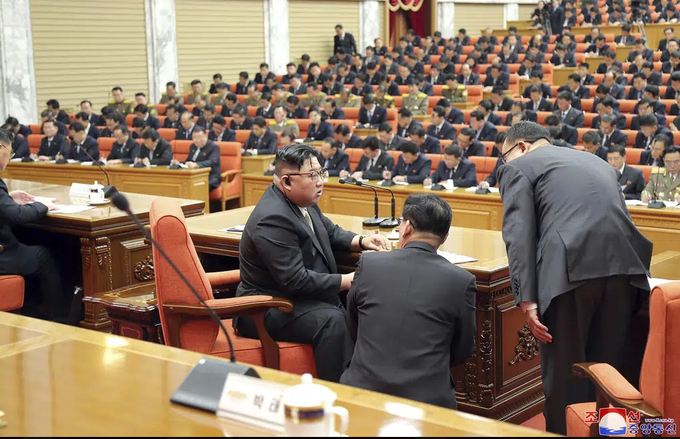October 1, 2025 | 02:12 GMT +7
October 1, 2025 | 02:12 GMT +7
Hotline: 0913.378.918
October 1, 2025 | 02:12 GMT +7
Hotline: 0913.378.918

In this photo provided by the North Korean government, North Korean leader Kim Jong Un, third right, speaks with people involved during a meeting of the ruling Workers’ Party at its headquarters in Pyongyang, North Korea Sunday, Feb. 26, 2023. Independent journalists were not given access to cover the event depicted in this image distributed by the North Korean government. The content of this image is as provided and cannot be independently verified. Korean language watermark on image as provided by source reads: "KCNA" which is the abbreviation for Korean Central News Agency. Korean Central News Agency/Korea News Service via AP
South Korean experts estimate that North Korea is short around 1 million tons of grain, 20 percent of its annual demand, after the pandemic disrupted both farming and imports from China.
Recent, unconfirmed, reports have said an unknown number of North Koreans have died of hunger. But observers have seen no indication of mass deaths or famine in North Korea.
During a high-level meeting of the ruling Workers’ Party that began Sunday, senior party officials reviewed last year’s work on state goals to accomplish “rural revolution in the new era,” the official Korean Central News Agency reported.
The report said that the meeting of the party’s Central Committee will identify “immediate, important” tasks on agricultural issues and “urgent tasks arising at the present stage of the national economic development.”
KNCA didn’t say whether Kim spoke during the meeting or how long it would last. Senior officials such as Cabinet Premier Kim Tok Hun and Jo Yong Won, one of Kim’s closest aides who handles the Central Committee’s organizational affairs, were also attending.
The meeting is the first time the party has convened a plenary session only to discuss agriculture. Monday’s report didn’t elaborate on its agenda, but the party’s Politburo said earlier this month that a “a turning point is needed to dynamically promote radical change in agricultural development.”
Most analysts North Korea’s food situation today is nowhere near the extremes of the 1990s, when hundreds of thousands of people died in a famine. However, some experts say its food insecurity is likely at its worst since Kim took power in 2011, after COVID-19 restrictions further shocked an economy battered by decades of mismanagement and crippling U.S.-led sanctions imposed over Kim’s nuclear program.
In early 2020, North Korea tried to shield its population from the coronavirus by imposing stringent border controls that choked off trade with China, its main ally and economic lifeline. Russia’s war on Ukraine possibly worsened the situation by driving up global prices of food, energy and fertilizer, on which North Korea’s agricultural production is heavily dependent.
North Korea reopened freight train traffic with China and Russia last year. More than 90% of North Korea’s official external trade goes through its border with China.
Last year, North Korea’s grain production was estimated at 4.5 million tons, a 3.8% drop from 2020, according to South Korean government assessments. The North was estimated to have produced between 4.4 million tons to 4.8 million tons of grain annually from 2012-2021, according to previous South Korean data.
North Korea needs about 5.5 million tons of grain to feed its 25 million people annually, so it’s short about 1 million tons this year. In past years, half of such a gap was usually met by unofficial grain purchases from China, with the rest remaining as unresolved shortfall, according to Kwon Tae-jin, a senior economist at the private GS&J Institute in South Korea.
Kwon says trade curbs due to the pandemic have likely hindered unofficial rice purchases from China. Efforts by North Korean authorities to tighten controls and restrict market activities have also worsened the situation, he said.
It’s unclear whether North Korea will take any action to quickly address its food problems. Some experts say North Korea will use this week’s plenary meeting to boost public support of Kim during his confrontations with the United States and its allies over his nuclear ambitions.
Despite limited resources, Kim has been aggressively pushing to expand his nuclear weapons and missile programs to pressure Washington into accepting the idea of the North as a nuclear power and lift international sanctions on it. After a record year of weapons testing activities in 2022, North Korea launched an intercontinental ballistic missile and other weapons in displays this month.
(AP)

(VAN) China’s freeze on U.S. soybean purchases hits a key GOP constituency in the run-up to 2026 midterm elections.

(VAN) President Xi Jinping's festive greetings ahead of the eighth Chinese Farmers' Harvest Festival, which fell on Tuesday this year, were a clear signal that China regards food security as a core strategic issue.

(VAN) BBNJ Agreement will enter into force in January.

(VAN) Demonstrations have been planned around the world this week ahead of the United Nations General Assembly and New York Climate Week.

(VAN) After years of intense deliberation, the European Commission has finally given its nod to the Mercosur and Mexico agreement.

(VAN) A group of African youth, visiting China for the 24th Chinese Bridge-Chinese Proficiency Competition for Foreign College Students, journeyed across continents the 'father of hybrid rice.'

(VAN) The complaints come at a time when the demand for eggs is still increasing, since the consumer considers eggs to be a relatively cheap source of protein at a time of high inflation.